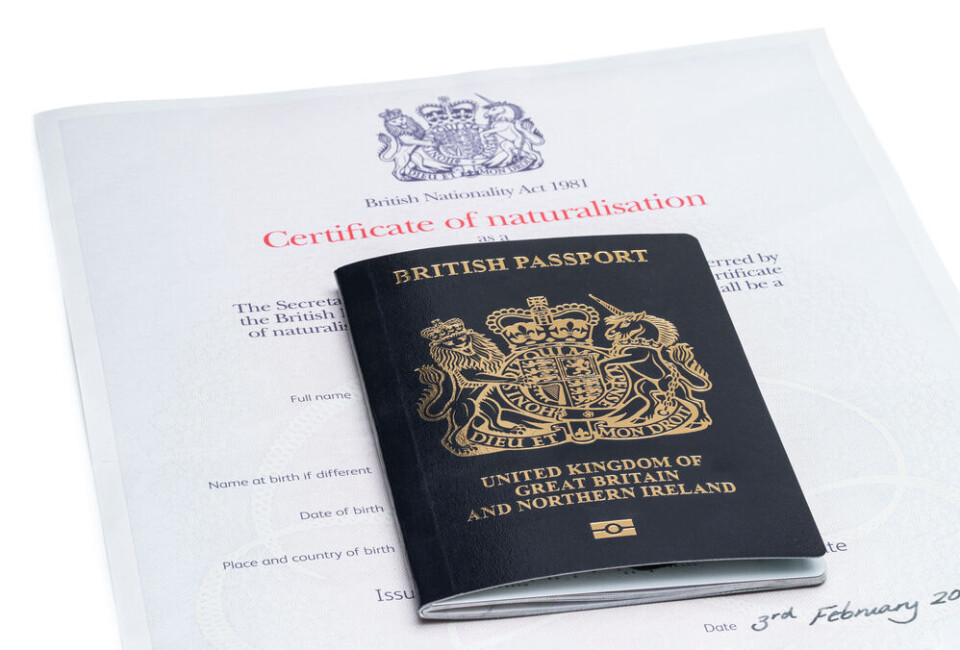-
Britons are the largest foreign community of second-home owners in Nouvelle Aquitaine
See which other departments in the region are popular with British nationals
-
Travellers risk extra costs under new Eurotunnel ticket rule
Some fare options are less flexible and less forgiving of lateness
-
May will be difficult month for train travel in France, warns minister
Two major train unions are threatening to strike and are ‘not willing to negotiate’, he says
Post-Brexit number of French people gaining British nationality soars
The same trend was observed in the other direction, with numbers of Britons becoming French having increased by a factor of 20 from 2010 to 2019

There has been a significant jump in the number of French people gaining British nationality since 2016, with more than 18,000 people having made the shift since the Brexit vote.
A total of 18,352 became British in the five years between the third quarter of 2016 and the third quarter of 2021, according to the latest figures provided by The Migration Observatory at the University of Oxford. In comparison, only 728 French people became British in 2015.
One resident, Gautier, who is originally from Avignon but has been living in London with his family for 15 years, told Le Figaro that “uncertainty” had pushed him to make the change.
He said: “After the UK left the European Union, I wasn’t certain that my rights would stay the same, so I decided to become British.”
‘We felt like second-class citizens’
Aurore and Cédric, a French couple living in London, started the process to gain British nationality in early 2022. They said: “Obtaining British citizenship represents security for the future.”
Cédric, who is originally from Châteauroux, said: “Brexit has given us the impression that we have become second-class citizens even though we have been living here for 20 years.”
His partner Aurore added: “We feel as though getting British nationality will offer us more protection if immigration laws change.”
This matches the report by The Migration Observatory, which stated: “Multiple factors affect migrants’ desire and ability to become citizens of the country they have moved to, ranging from the desire for recognition as a full member of society and the right to vote, legal certainty about their residence rights, pragmatic advantages (e.g. easier travel), to a symbol of status.
“Reasons for seeking citizenship are not necessarily ‘positive’ and can include migrants’ fears of poor treatment or discrimination.”
To obtain British nationality, residents must have lived in the UK for five years and obtained a permanent residency card. It costs £1,629.20 to apply (€1,907.35) – compared to €55 for Britons applying to become French – including costs for naturalisation, a language test for those who have not been to a British university, a citizenship test, the ceremony, and a biometric passport.
Applicants will also likely be required to show proof of income, proof of home and work address, and train or plane tickets to demonstrate entry and exit into the country. Two references from people of ‘good moral standing’ are also needed. The process can take three to six months.
‘This way I feel like I have one foot in both countries’
Some French people who have gained the nationality say that they still feel French as well (which is usually the case legally-speaking, as there is no ban on maintaining both nationalities).
Léopoldine, a lawyer from Grenoble who gained citizenship in 2017, said: “I [still] feel French. I feel as though I have one foot in my country of residence and one foot in my home country.”
However, she stated that professionally, people have treated her differently since she became British.
Gautier, co-director of an interior design company, said the same. He said: “I feel as though I belong to the same club as my co-workers. They know [now] that I’m not about to leave.”
Grants of EU (including French) nationalities to Britons have also exploded
It is a similar story in reverse; the number of acquisitions of EU nationality citizenships by British people exploded after 2016. While the average from 2010 to 2015 was 2,710 per year, this rose to 7,426 in 2016, and hit 30,742 in 2019, Eurostat figures show.
In 2019, 4,088 British people became French, compared to 374 in 2015, and 205 in 2010.
Read more:Obtaining French nationality can take up to four years, study shows
Available data for 2020, however, show a drop in the number of British people obtaining nationality of an EU country (including 3,146 becoming French), perhaps suggesting that many of those who wanted to make the change after Brexit have now done so. The Covid health crisis may also have played a part.
Moving forward, an additional complication for Britons is the fact that while the UK was in the EU they could always keep their existing nationality, whereas some countries, such as Germany, do not allow dual nationality for non-EU citizens.
Related articles
Applying for French nationality: What it's like
'Unsure where I belong after French nationality interview'
























